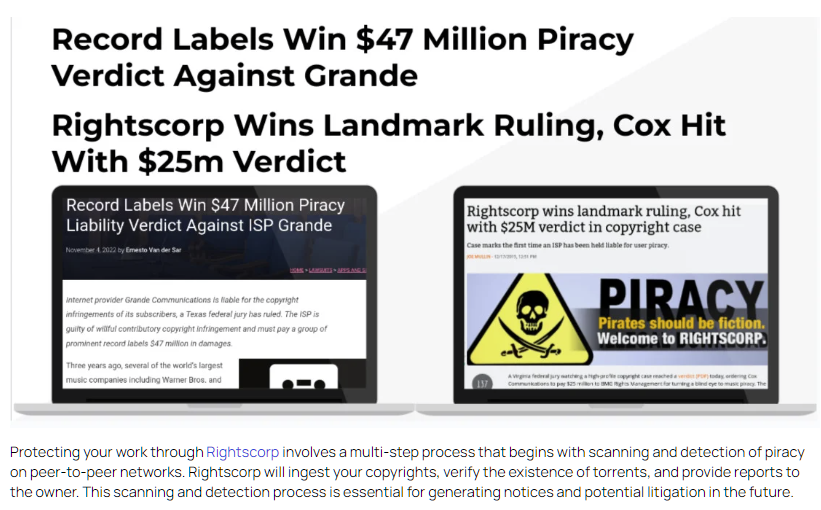 At a time when a limited number of rightsholders were demanding thousands of dollars from alleged BitTorrent pirates, Rightscorp focused on the budget end of the market.
At a time when a limited number of rightsholders were demanding thousands of dollars from alleged BitTorrent pirates, Rightscorp focused on the budget end of the market.
By attaching settlement demands to DMCA notices sent to ISPs, Rightscorp hoped these would be forwarded intact to subscribers. Rather than demand large sums, Rightscorp requested a relatively small amount, typically around $20, an amount payable through a dedicated portal. Not all ISPs passed the notices on but, thanks to those that did, Rightscorp believed it had a strong base to build on.
Over the next few years, the plan to turn piracy into profit failed to meet its key objective. At the time, Rightscorp was a publicly listed company but was hemorrhaging money. In 2014, the company revealed a $2.2m loss for the previous year, $6.5m in losses since the company launched in 2011.
After reporting even more losses a year later, Rightscorp stared into the abyss, but then a key event threw it a lifeline. A federal court in Virginia found that, by failing to take appropriate action in response to Rightscorp notices, ISP Cox Communications became liable for subscribers’ copyright violations when they downloaded and shared music owned by music publisher BMG.
Unprofitable But On the Money
For at least five years Rightscorp had warned that ISPs risked huge liability if they failed to disconnect repeat infringers. The company hadn’t been able to turn that into profit but momentum was building for companies with access to Rightscorp’s historical piracy monitoring data.
After being prompted by Rightscorp, the RIAA successfully sued Grande Communications and then won $1 billion in damages from Cox Communications, all underpinned by Rightscorp data.
Can The Indie Market Give Rightscorp a Boost?
Appeals in the above cases are still ongoing but Rightscorp’s earlier warnings were proven correct. The big question now is whether Rightscorp can somehow turn that prophecy into profit. In an announcement this week, Rightscorp said that it had joined A2IM (American Association of Independent Music), a non-profit trade organization representing the independent music industry in the United States.
“This collaboration aims to combat illegal peer-to-peer (P2P) torrent digital copyright theft and safeguard the rights of creators and content owners in the ever-evolving digital landscape. A2IM represents over 600 independent music labels and businesses, advocating for their rights and fostering a sustainable and vibrant independent music sector,” Rightscorp’s announcement reads.
Rightscorp says it joined A2IM with the intention to “educate and service the interests of independent musicians, songwriters, and music publishers” based on its “proven track record of successful initiatives” but whether independent labels have any interest in complex ISP liability lawsuits is unknown.
Collaboration or Just Networking?
It’s also unclear whether Rightscorp’s definition of “collaboration” with A2IM goes any further than the benefits usually enjoyed by ‘Associate Members’ of the organization, i.e. having access to the labels and being in a better position to offer relevant services.
After Rightscorp became an A2IM associate member, A2IM did publish an outline of Rightscorp’s business proposals, which cover three main components: having pirates kicked off the internet, persuading pirates to pay a settlement, or using Rightscorp data to take legal action, presumably against intermediaries.
“Once piracy has been detected, Rightscorp can provide termination notices to internet providers for their users who are infringing on copyrighted works. These notices serve as legal notification to internet providers of infringing activity from their customers,” the Rightscorp ‘spotlight‘ reads, alongside images from Ars Technica and TF.

“Additionally, Rightscorp has established a Notice Settlement Model, which includes a 50/50 split for any amounts received, and ISPs will have the responsibility to forward our notices in adherence to DMCA requirements for termination of repeat infringement activity.”
ISPs Are Now Acutely Aware of the Rules
While there’s little doubt that ISPs are in a much more precarious position than they were six years ago, they have the benefit of knowing exactly what is required of them. The question is whether that will make them more – or less – cooperative.
Rightscorp seems to suggest the former but the idea that it can send actionable “termination notices” to ISPs appears somewhat speculative on the cooperation front. Repeat infringer policies are for ISPs to determine and then actioned in a manner of their choosing. While that didn’t go as planned previously, they’re unlikely to make the same mistakes moving forward.
As for the notice settlement model, that assumes that ISPs will forward cash demands to their customers along with DMCA notices. There is zero requirement for that under the DMCA but only time will tell how far ISPs will be prepared to go; the underlying threat for uncooperative ISPs is that Rightscorp data could be used to sue them.
“Rightscorp also offers a Litigation Model, which is customizable based on the range of copyrights held in the data base. Successful litigation precedents have already been set by Rightscorp, and parameters of infringement within the data base can be tailored to your specific needs. Rightscorp’s fee for this service is proportional to the scope of the complaint,” the advert reads.
There is no mention of the above on the Rightscorp website but we did find something unusual. Rightscorp.com has been the company’s domain for years but located at Rightscorp.co, a domain registered just recently, a shiny new website has appeared featuring the logos of major labels, publishers and industry groups.






